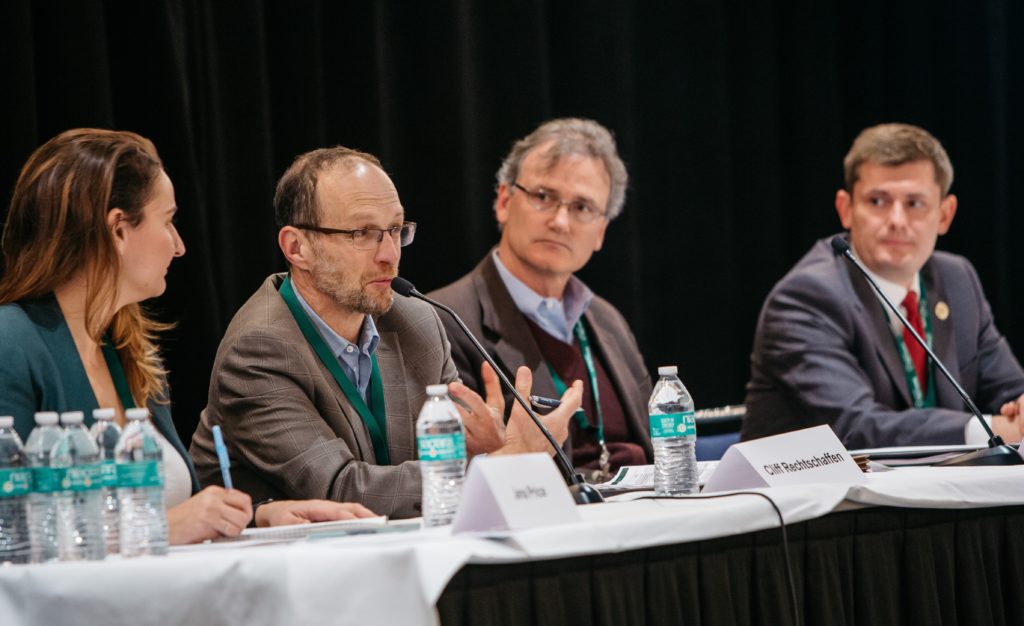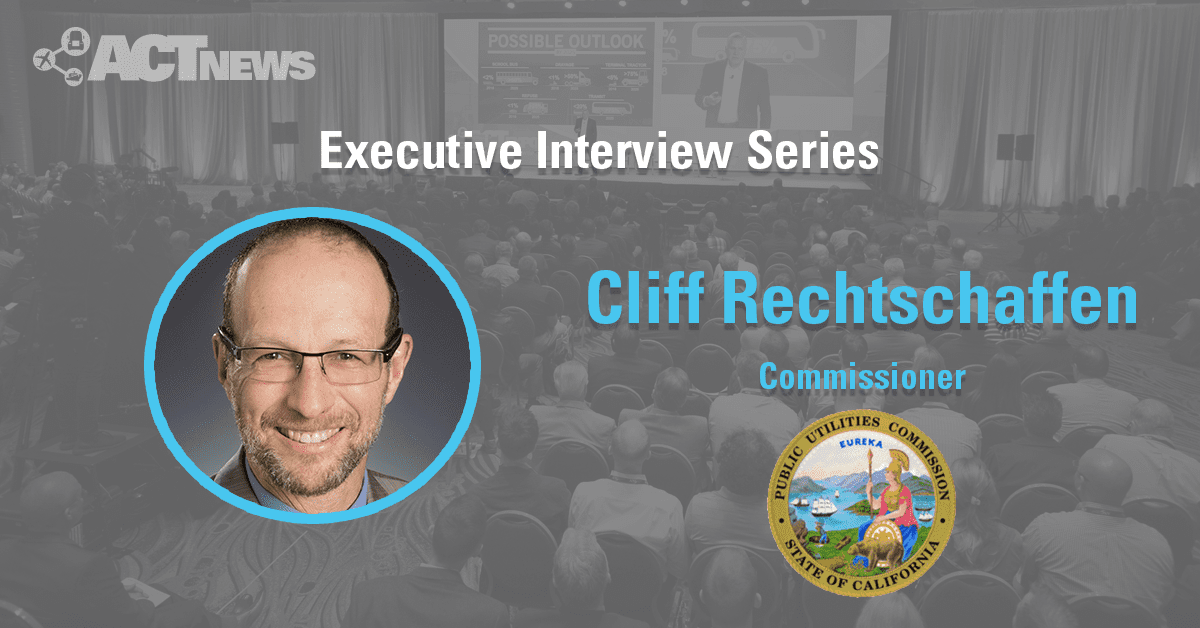An ACT News Executive Interview with Cliff Rechtschaffen, Commissioner, California Public Utilities Commission, guiding California’s groundbreaking energy programs and policies.
Clifford Rechtschaffen was appointed to the California Public Utilities Commission (CPUC) by Governor Jerry Brown in January 2017. At the CPUC, his key areas of interest include decarbonization, safety, environmental justice, and enforcement. Commissioner Rechtschaffen is the assigned Commissioner on several safety and emergency response proceedings, the Renewables Portfolio Standard (RPS) proceeding, several proceedings involving biomethane, and the Energy Savings Assistance program that provides efficiency programs for low income consumers. Commissioner Rechtschaffen also has been spearheading several internal agency initiatives, including the development of an Environmental and Social Justice Action Plan with Commissioner Guzman Aceves; the development of a more uniform and formal CPUC enforcement policy with President Picker; and with Commissioner Randolph on the Policy and Governance Committee, an effort to make CPUC proceedings more accessible to the public. Commissioner Rechtschaffen serves as the CPUC representative on the Low Income Oversight Board and one of two Commissioners on the Senate Bill 350 Disadvantaged Communities Advisory Group.
Capturing the methane emitted from organic waste products, including animal manure, eliminates significant emissions of the high global warming potential gas to the atmosphere.
Act News caught up with Cliff to learn more about his efforts on all things related to climate, energy, and the environment.
ACT News: In December, 2018, the California Public Utilities Commission (CPUC), the California Air Resources Board (CARB), and the California Department of Food and Agriculture (CDFA) announced funding for six pilot projects in the San Joaquin and Sacramento Valleys designed to produce renewable natural gas (RNG) from anaerobic digesters that will recycle manure from dairy cows. Why is the recycling of dairy manure important for air quality in California?
Cliff Rechtschaffen: The CPUC, in partnership with the California Air Resources Board and the California Department of Food and Agriculture, has provided funding for dairy biomethane projects to demonstrate the connection of digesters to gas pipelines. This program was created as part of California’s strategy to reduce emissions of short-lived climate pollutants.
Capturing the methane emitted from organic waste products, including animal manure, eliminates significant emissions of the high global warming potential gas to the atmosphere. In addition to the climate benefits of capturing methane, digester projects capture gas that would otherwise emit volatile organic compounds, hydrogen sulfide and ammonia into the air. Volatile organic compounds are an ozone precursor, so capturing them can prevent harmful air quality. Methane in biogas is also an ozone precursor, so capturing the methane in biogas is helpful for preventing the formation of ozone.
ACT News: One aspect of these dairy pilot projects is to demonstrate that RNG can be refined to be pipeline ready (as biomethane) and injected into the gas utility carrier pipeline system. Why is it important to focus on gas quality specifications and pipeline injection standards for biomethane?
Cliff Rechtschaffen: The CPUC has standards for gas quality and pipeline injection standards, and we recently issued a proposed decision that would modify those existing standards.

We have standards for two main reasons. First, we want to ensure there are no constituents in the gas that pose public health or public safety risks. It’s imperative that there are no toxic materials in the gas, or anything that could cause an explosion. Second, the CPUC has another set of criteria to ensure that the gas won’t damage the end-use equipment. For example, siloxanes damage the end use equipment, so we have siloxane testing requirements. Additionally, gas heating values are important for ensuring that the end-use equipment functions properly, so we have developed standards for that aspect of biomethane.
ACT News: How do you foster innovation at the CPUC?
Cliff Rechtschaffen: That is a very good question; it’s a challenge that my colleagues and I have been working on. One, we try to break down silos so that people are working more collaboratively and across disciplines. Two, we try to create a culture in which speaking out and questioning assumptions is welcomed and rewarded, and not perceived as threatening. And three, we are trying to recruit new and diverse staff with a variety of professional backgrounds and life experiences, who can raise new ideas and ways of doing things.
ACT News: What has been your favorite project at the CPUC?
Cliff Rechtschaffen: There are two in particular that I have most enjoyed working on since I was appointed in 2017.
First, with Commissioner Guzman Aceves, I took the lead in developing an Environmental & Social Justice Strategy, which was adopted by the Commission last month. The strategy sets forth a broad vision for advancing environmental justice goals in all our policies and proceedings, as well as a roadmap with numerous specific actions for us to take to meet these objectives.
Second, with Commissioner Randolph, I helped develop and last year the Commission adopted a Tribal Consultation Policy. We also appointed our first formal tribal liaison, Stephanie Green. As part of developing and implementing this policy, I’ve met with a number of tribes around the State, to discuss their clean energy goals and desire for energy independence, the challenges they face from de-energization of power lines, and their efforts to bring high speed Internet service to their communities. This includes a recent trip to meet with the chairs of the Yurok and Karuk tribes on their lands in the far northwestern corner of California, where some parts of the Yurok community just received electricity service last year, and others still lack access to decent broadband services.
My fundamental hope is that we can completely wean California off fossil-fueled transportation as soon as possible.
ACT News: What advice would you give to recent new hires at the CPUC?
Cliff Rechtschaffen: Don’t be afraid to ask questions!
- Visit industry divisions other than those you are working in and see what they’re doing.
- Ask to shadow a Commissioner for a day (I’ll volunteer!) to see what our job is like.
- Watch or attend all Commission business voting meetings, to see the breadth of what the Commission does, and to hear the public interact with us.
ACT News: What are your hopes for the clean transportation and energy industry?
Cliff Rechtschaffen: My fundamental hope is that we can completely wean the state off fossil-fueled transportation as soon as possible. More immediately, I hope we can meet and exceed the 5,000,000 electric vehicles by 2030 goal set by Governor Brown’s 2018 Executive Order. We currently have half a million electric cars on the road in California—an excellent accomplishment–but a lot remains to be done by 2030. To meet the 2030 target, I will be working to ensure that electricity rapidly increases as the fuel of choice for transportation, that disbursement of subsidies and expansion of transportation electricity infrastructure prioritizes low-income and disadvantaged communities, and that sectors such as transit, school buses, and heavy-duty vehicles are a big part of this transformation.
We know that a number of communities in the state, especially those with lower incomes and which are often near ports, highways and other substantial transportation-related emission sources, suffer from poor air quality. We must focus on electrifying the transportation in those communities to ensure that everyone benefits from our clean energy programs. I also envision a competitive marketplace for EV products, both light and heavy duty, and on both the vehicle and infrastructure sides.
Communities near ports, highways and other substantial transportation-related emission sources, suffer from poor air quality. We must ensure these communities benefit from our clean energy programs.
ACT News: What other leadership roles do you hold in the community and/or what volunteer efforts do you support?
Cliff Rechtschaffen: I’m on the Board of Directors of Ride for a Reason, a bike ride/fundraising event to generate awareness about the need for more funding for public school education, and to raise money to support programs and services at ten Oakland public schools. As part of this event, close to 300 parents, teachers, students, and community members (including me!) cycle from Oakland to Sacramento (109 miles), where the event culminates in a rally at the state capitol. It’s a great event and inspiring to see so many dedicated community members participating in it.
ACT News: If given a chance, who would you like to be for a day?
Cliff Rechtschaffen: Steph Curry of the Warriors. I’ve been a big basketball fan my whole life and I’m a diehard Warriors fan now.


